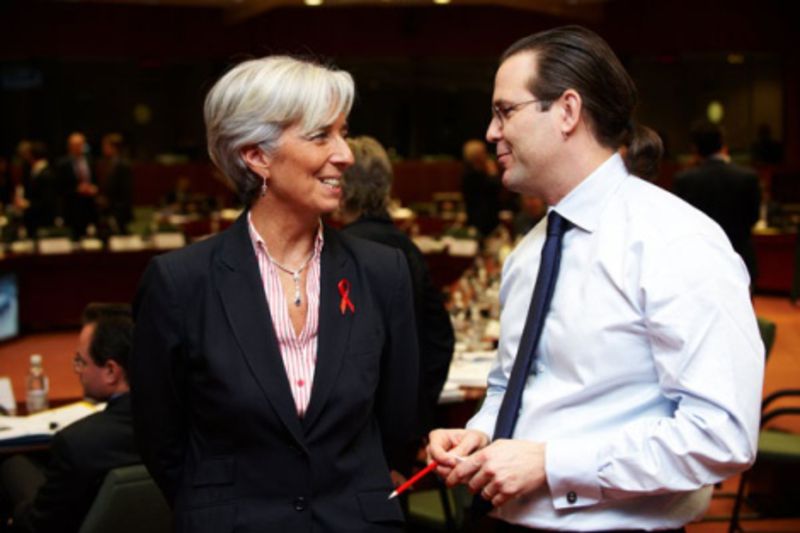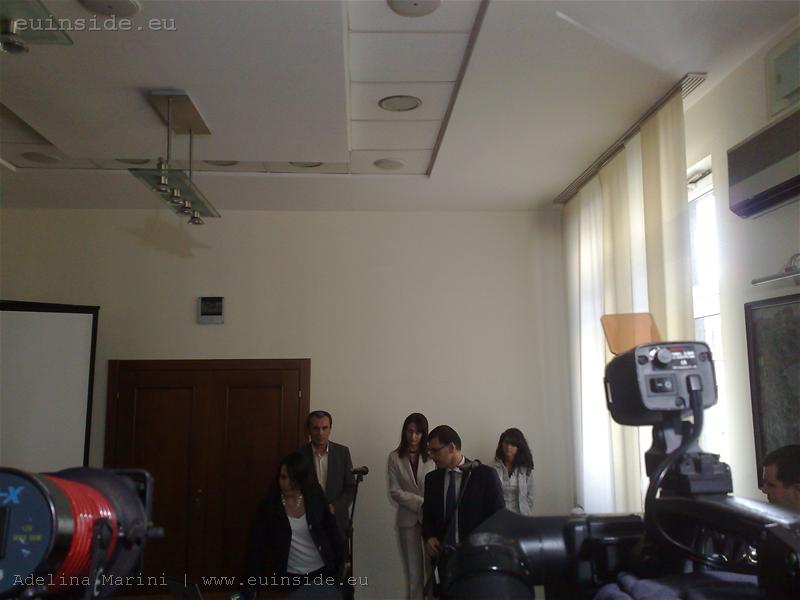The tripartitie coalition reports great economic successes but doesn't want to be asked questions
Adelina Marini, June 10, 2009
 In good mood, with great self-confidence and focused on the upcoming parliamentary elections, the prime minister Sergey Stanishev, together with his deputy prime ministers, presented a report of the work, done by the government for the last 4 years. The presentation took more than an hour and that was the reason only 2 questions to be allowed because all deputy prime minister, with the prime minister on top, appeared to be very occupied. Let me say it again - 4 years of work reported, that caused a lot of disputes, protests, strikes, demonstrations and no opportunity for questions or for a long discussion about that's being done and what not. Instead, the presentation was full of calls on the opposition, criticism for the lack of other alternatives of the current government and, after all, motley pre-election rhetoric mixed with positive news for which the prime minister said he knew that the good news is no news.
In good mood, with great self-confidence and focused on the upcoming parliamentary elections, the prime minister Sergey Stanishev, together with his deputy prime ministers, presented a report of the work, done by the government for the last 4 years. The presentation took more than an hour and that was the reason only 2 questions to be allowed because all deputy prime minister, with the prime minister on top, appeared to be very occupied. Let me say it again - 4 years of work reported, that caused a lot of disputes, protests, strikes, demonstrations and no opportunity for questions or for a long discussion about that's being done and what not. Instead, the presentation was full of calls on the opposition, criticism for the lack of other alternatives of the current government and, after all, motley pre-election rhetoric mixed with positive news for which the prime minister said he knew that the good news is no news.
That is why euinside decided to offer you the report together with the questions that we couldn't ask.
An interesting fact though was the frequent use of the word means of living hood (very specific word), used in the context of fight with unemployment, the creation of jobs and the increase of productivity. I pay attention to the word because it is an old one, used in historical analyses to show what people used to to for living some hundreds of years ago. Despite this, the lack f modern vocabulary might be a sign of the lack of modern visions but this is something you could see yourself by reading the report.
In the field of economy, presented partially by the prime minister and more in detail by the deputy prime minister who is also a minister of foreign affairs - Ivaylo Kalfin, the government reports an average annual speed of growth of the GDP for the period 2005-2008 of 6.2% while the average for the same period for EU27 was 2.2%. Of course, here the fact that for the same period Bulgaria has double digit inflation is not being mentioned, as well as the fact that the economy is based mainly on foreign investments. What hasn't been mentioned too is that from the point of view of the need for the Bulgarian economy to catch up with the most developed economies in the EU, such growth is not enough. And also, we should take into account the very low level from which the Bulgarian economy started to grow.
With regard to the high inflation, the government explains that it was due to the speeding up of  the convergence of the Bulgarian economy with the rest of the EU economies as well as because of the constant increase of the prices of oil products through the year. The convergence, in principle, is a process which should end with Bulgaria's membership to the EU but the high inflation is one of the biggest obstacles.
the convergence of the Bulgarian economy with the rest of the EU economies as well as because of the constant increase of the prices of oil products through the year. The convergence, in principle, is a process which should end with Bulgaria's membership to the EU but the high inflation is one of the biggest obstacles.
The real GDP for the first quarter of the year is negative, is also written in the report -3.5% which is due to the new developments in the Bulgarian economy, caused by outside and inner shock.
The government also praised itself for the attraction of 23 bn euro direct foreign investments (DFI). According to Ivaylo Kalfin the GDP has been almost doubled for the years of government of the tripartite coalition or 70%, to be more exact, from 38 bn lv (19.5 bn euro) to 66,7 bn lv (34.2 bn euro). The export has also been doubled, reported Kalfin but in times of crisis this index actually went back to the start.
With regard to the raise of the quality of life, Mr. Kalfin called on Ivan Kostov (prime minister 1997-2001) to pay 10,000 lv (5,128 euro) to the pensioners from Kyustendil as he promised a week ago to pay the difference for everyone whose pension had been decreased during his governance. Kalfin said that the introduction of the point system for forming a pension has led to the decrease of some pensions. As a whole the average pension now is 260.97 lv (134 euro), the average pension for length of service and age is 288.98 lv (148 euro), the minimum pension for insurance length of service and age is 136.08 lv (70 euro) and the social pension for age is 100.86 lv (52 euro), is also written in the report. But in spite of the need for cutting expenses, which the government announced just less than a month before the end of the term, the pensions will be raised with 9% from the 1st of July - just 4 days before the parliamentary elections.
The government also reported the creation of a Silver fund, financed by the budgetary surplus. This information gave Ivaylo Kalfin the opportunity to remind his critics that instead of spending from the treasury, the government has indeed doubled the money in the treasury - at the moment there is 8 bn lv (4 bn euro). 4 years ago that sum was only 4 bn lv (2 bn euro). He said with determination that the government from the beginning of the year has spend less than the income in the budget and also that the redistribution through the budget is already 37% from the GDP and the promise was for around 40%.
Kalfin also said that 25 administrative burdens have been removed centrally while there are still problems with some municipalities among which the municipality of Sofia the major of which is one of the main rivals of the ruling coalition.
 The questions to which we couldn't get an answer were the following: Why given those optimistic data of the government, most international financial institutions still criticize our country for the low productivity? Why the government refused to reconsider the budget since at least from 2 months everyone is aware that the crisis is coming to Bulgaria and the decision to decrease the salaries of ministers and their deputies just a month before the elections is nothing against the background of the decision the pensions to be increased with 9% from the 1st of July? Why the government did not report about how it spent the budgetary surplus in the end of last year?
The questions to which we couldn't get an answer were the following: Why given those optimistic data of the government, most international financial institutions still criticize our country for the low productivity? Why the government refused to reconsider the budget since at least from 2 months everyone is aware that the crisis is coming to Bulgaria and the decision to decrease the salaries of ministers and their deputies just a month before the elections is nothing against the background of the decision the pensions to be increased with 9% from the 1st of July? Why the government did not report about how it spent the budgetary surplus in the end of last year?
In the meantime the National Statistic Agency reported today, coincidentally, that the GDP for the first quarter of the year is almost 14 bn lv (7 bn euro). This is 3.5% fall in comparison to the same period last year. And again, according to the NSA one worker in Bulgaria creates 9.3 lv GDP per hour (4.8 euro).
 | © Consilium
| © Consilium | © euinside
| © euinside